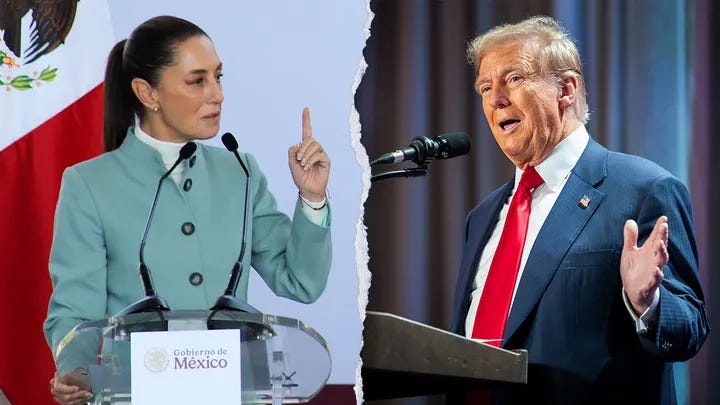🇲🇽 Mexico Hits Back at Trump’s Tariff Plan
President Sheinbaum warns of economic and social consequences.
Mexican President Claudia Sheinbaum announced on Tuesday that she would impose retaliatory tariffs in response to President-elect Trump's proposed trade measures. This comes after Trump outlined a plan to implement tariffs aimed at curbing drug trafficking and immigration into the United States.
Sheinbaum's statement highlights growing tension between the United States and its trade partners, as leaders from Mexico, Canada, and China have emphasized the mutual benefits of cooperative trade agreements. On Monday, Trump’s plan revealed that effective January 20, 2025, a 25% tariff will be implemented on all goods imported from Canada and Mexico and a 10% tariff on Chinese imports. These new tariffs would add to any existing ones.
Chinese and Canadian officials were quick to push back. "No one will win in a trade war or a tariff war," said Liu Pengyu, spokesperson for the Chinese Embassy, in a statement to Reuters. Both countries reiterated the importance of trade collaboration for economic stability.
The U.S., Mexico, and Canada are currently bound by the United States-Mexico-Canada Agreement (USMCA), which replaced the North American Free Trade Agreement (NAFTA) on July 1, 2020. This agreement promotes reciprocal trade designed to support high-paying jobs and economic growth in all three countries.
In a letter to Trump, Sheinbaum expressed concern over the potential economic fallout of his proposed tariffs. She pointed out that major automakers like General Motors, Stellantis, and Ford, which have been operating in Mexico for decades, would be directly impacted. "Why impose a tariff that would jeopardize them? Such a measure would be unacceptable and would lead to inflation and job losses in both the United States and Mexico," she wrote.
Sheinbaum also addressed Trump's plans to deport millions of undocumented immigrants, highlighting the interconnected nature of U.S.-Mexico challenges. She emphasized that the influx of weapons into Mexico and the flow of drugs into the U.S. are deeply rooted issues.
"The U.S. faces a public health crisis related to drug consumption," she said. "If even a small percentage of what the United States allocates to war were instead dedicated to building peace and fostering development, it would address the underlying causes of human mobility."
Sheinbaum’s remarks underscore the complexity of the economic and social ties between the two nations and the potential consequences of disrupting these relationships.






